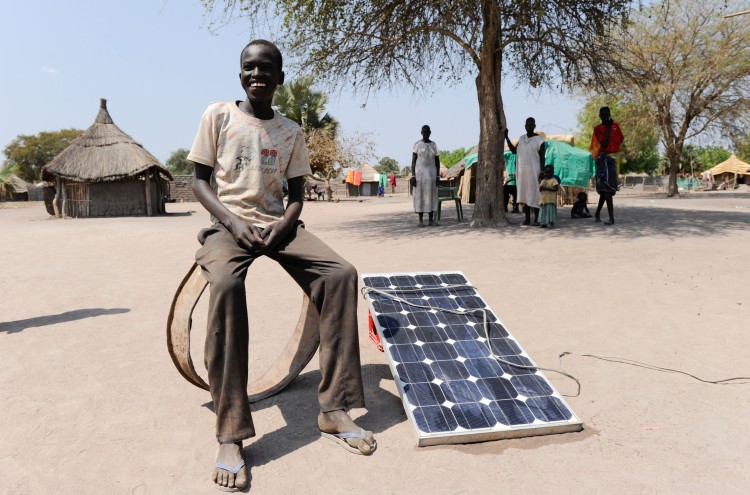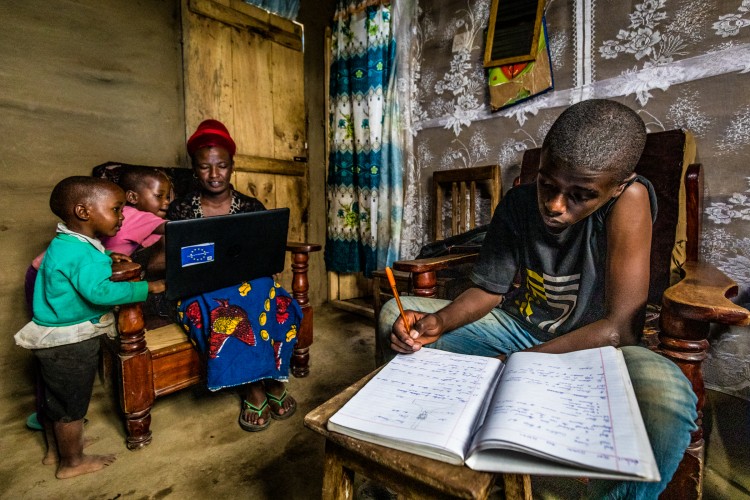


The rapid development of solar energy has helped create access to electricity for millions of people.
Several companies have emerged that develop small home systems with a solar panel that provide light, radio and sometimes even TV to people living remotely. These services can significantly improve the way that rural households live, especially if they previously did not have access to electricity. This motivated FMO to support energy players active in the off-grid energy market, including Orb Energy in Kenya.
Because selling products to people who live in distant rural areas and have unstable incomes from agriculture is expensive and difficult, the off-grid energy market is still nascent and risky. In such markets, Development Finance Institutions (DFIs) like FMO can play an important role. The off-grid market’s high risk and high developmental impact nature made it a strategic focus sector for FMO and the Access to Energy Fund (AEF).
FMO asked independent experts to study the development impacts of solar home systems (SHS) provided by Orb Energy in Kenya to help answer the question whether solar home systems indeed live up to their development impact potential, and how the development impact can be maximised in this sector.
There are still millions of people living without access to electricity. FMO wants to be an enabler to companies and support them in their quest to bring prices of off-grid systems down further such that the business case for obtaining clean off-grid electricity further improves.
1. Poverty alleviation
Both our study on Orb Energy and a study by 60Decibels show that investments in the off-grid sector have not significantly contributed to poverty alleviation. The study finds that SHS primarily deliver an increase in living standards, but that the economic savings generated with the system are (with prices of SHSs during the time of the study, which have come down since) not enough to earn back the system in a foreseeable timespan (of less than five years). Orb Energy clients had a 14% likelihood of living below the $1.5/day poverty threshold. The average of many other off-grid investments studied by 60 Decibels was a little over a third of customers live in poverty (compared to 60% across the countries where their projects were undertaken).
|
2. Over-indebtedness
The study on Orb Energy’s customers finds that the purchased SHS generally do not facilitate significant income-generating activities, while clients get loans to purchase the systems. Also the 60decibels report mentions that “while over-indebtedness is still only hitting a small proportion of customers, the negative impacts they experience are significant: 4% of families we spoke to said that their energy payments were a ‘heavy burden’ and 5% are forced to regularly cut back their food consumption in order to make payments. |
|
3. Mini-grids Mini-grids have the potential to reach a higher proportion of low-income families. The nature of the mini-grid business model requires a high density of connections to cover the fixed costs of setting up a localized grid. According to the 60Decibels study, mini-grids also offer increased income generating opportunities, higher capacities and thus more potential for businesses to develop.
Cleaning process of a mini-grid by Husk (India) |
FMO thus feels encouraged to continue activities in the sector, helping connect more people with access to electricity in an (environmentally) clean and targeted manner. Off-grid electricity then also has the potential to create a positive impact on net household income and contribute towards poverty alleviation.
Some 13% of the global population does not have access to electricity.[1] The majority of those people live in Africa and in rural areas. Most of them use small kerosene-lamps to light their homes and firewood to cook their meals, and they travel to towns to charge their mobile phones. The advancements in solar energy technology have helped an increasing number of companies to develop tailor-made solar products, initially to provide lighting, but more recently in the realm of leisure (TV and radio), refrigeration, water pumps and water heaters. There are now over 200 companies providing such products in often difficult-to-reach places.
To many, Kenya was the cradle for the development of the off-grid sector, with low electrification rates (18% in 2010[2]), a large and growing population and a conducive business environment stimulated by the government. Kenya soon became the target of many new off-grid solar providers and has now become the most mature off-grid market with 61% of all active companies selling in Kenya (the highest in Africa)[3].

Through the Access to Energy (AEF) fund, FMO has supported the development of the sector since 2012. In 2015, FMO invested in Orb Energy Plc, a company that started selling off-grid solar products in India in 2007 and wanted to expand into the Kenyan market. FMO provided USD 2 million of equity from AEF to support that expansion the branch network and the addition of more manpower to service the difficult-to-reach client areas. Orb Energy’s business model relies to a great extent on cooperation with local (micro-)finance institutions (MFIs) which provide loans for Orb’s products and promote these products in credit groups. Orb Energy provides various solar home systems, from small solar lanterns with one light, to a TV set with four lights and integrated solutions for small business owners.
The impact on the lives of the beneficiaries, and thus FMO’s rationale to support the sector, was easy to comprehend: longer-lasting and better lighting at home, as well as avoiding the use of dirty and dangerous fire-based lighting sources significantly helped families in their daily chores. It also provided a greater sense of security at night, and better study opportunities for children at home. Investments in the off-grid sector therefore clearly contribute to several SDGs, but in particular SDG7 (Affordable and Clean Energy) and SDG13 (Climate Action).
A large household-level survey among 528 Orb Energy SHS users and a control group of 520 similar households without SHS at home was conducted to measure the economic impacts at the household level and environmental impacts from reduced greenhouse gas emissions related to the lighting source. The impact on how families with a solar system spend their daily lives was also studied in detail in order to capture other changes in their lives compared with households that did not have access to electricity, such as time spent studying at home by children and watching TV.

| Family using a solar home system |
The study confirmed that most households that use solar home systems live in rural areas (84%), but a share live in peri-urban (12%) or urban (4%) areas and use the system to cover black-outs on the grid. The average number of household members in the house is five and their median income is between 13,000 and 16,000 Kenyan Shilling (between EUR 110 – 135 per month). Placed against the income distribution in Kenya, this means that the average SHS client is classified as ‘lower middle income’ and is part of the 30-40% group in terms of income (with 100% being the wealthiest Kenyans). The clients are happy with the purchase they made: 38% was ‘very likely’ and another 30% ‘likely’ to recommend the Orb Energy SHS to friends and family [4]. They also use all features of the system significantly:
The detailed econometric comparisons between households with and without a system found that the system significantly affects the lives of SHS-owners in two main areas:
1. Household income and expenditures: Households were not found to earn more money with a system (e.g. to sell goods at night or charge mobile phones), but the use of the system still generated savings in household expenditures large enough to earn back the purchase of the system in approximately 7 years (interest paid not considered). For Orb Energy clients, the use of the system namely resulted in:
In total, SHS users save about KSh 147 a month (~€1.2) on expenditures for lighting and mobile phone charging. The payback period of 7 years is longer than the average lifespan of the battery (approximately five years). Ideally, the price of the systems should go down to ensure they are affordable. Orb Energy has already lowered its prices since the conclusion of the study.
2. Increase in living comfort: SHS users experience an increase in their level of comfort. Their satisfaction with the quality of lighting at home increases by almost 1 point on a 1-5 scale (to 4.4 on average) compared to households without a system. Spouses of the head of household and children also watch more TV, some 30 minutes and 10 minutes per day respectively. Lastly, they save time as they travel less often to buy batteries and/or kerosene: they save approximately 10 minutes per week.
Contrary to what is often claimed in the industry, though, the study did not find evidence that children study longer at home with a SHS. Most other existing academic studies also did not find an effect, or found only a very minor effect, on the amount of time children spent studying at home. However, children did spend more time watching TV.
3. Finally, the study also quantified the positive effect that the SHSs have on combating climate change: The 13-14 litre annual reduction in kerosene consumption per SHS means a reduction of about 37 kg of carbon dioxide equivalent GHG emissions per year per household with a SHS (on the basis of average use).
Client
Orb Energy
Country
Kenya